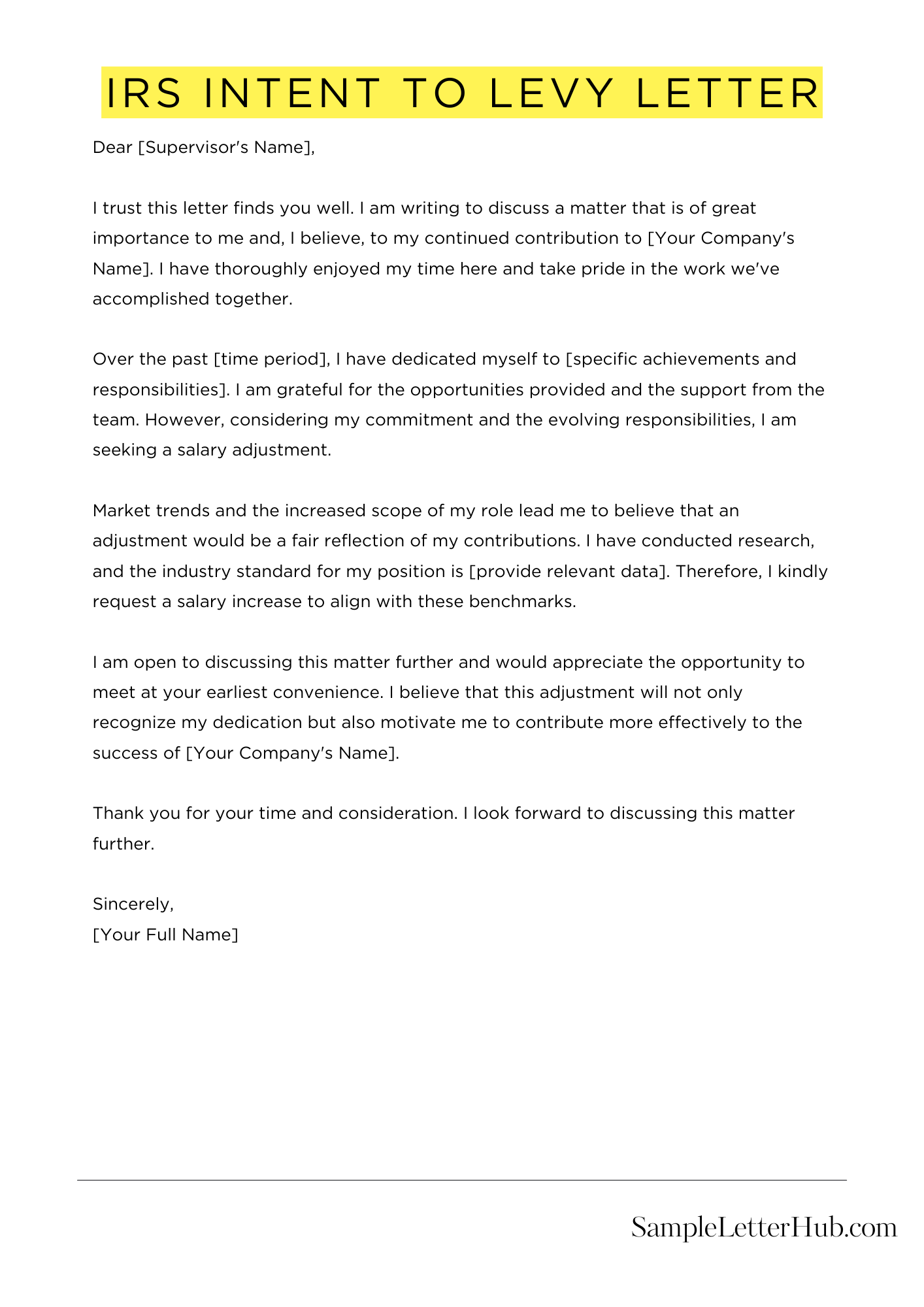An IRS Intent to Levy Letter is a formal notice from the Internal Revenue Service (IRS) informing you that they intend to seize your property or assets to satisfy an unpaid tax debt. This letter outlines the amount of the debt, the property or assets that may be seized, and the date by which the debt must be paid in full to avoid the levy.
In this article, we will provide you with several templates, examples, and samples of IRS Intent to Levy Letters. These templates will guide you in drafting a letter that effectively communicates your intent to levy property or assets to satisfy an unpaid tax debt.
IRS Intent to Levy Letter
Dear IRS,
I am writing in response to your recent notice of intent to levy. I understand that I owe a tax debt of [amount]. I am committed to resolving this matter and am requesting a payment plan.
I am currently experiencing financial hardship due to [brief explanation of hardship]. I have been working diligently to increase my income and reduce my expenses. I believe that a payment plan would allow me to pay off my debt in a timely manner while avoiding the negative consequences of a levy.
I have attached a proposed payment plan that outlines my financial situation and my ability to make monthly payments. I am confident that I can adhere to this plan and fulfill my tax obligations.
I would appreciate the opportunity to discuss this matter further with you. Please contact me at your earliest convenience to schedule a meeting or phone call.
Thank you for your time and consideration.
Sincerely,
[Your Name]

How to Write an IRS Intent to Levy Letter
An IRS Intent to Levy Letter is a serious matter. It means that the IRS is planning to seize your property to satisfy a tax debt. If you receive one of these letters, it’s important to take action immediately.
What is an IRS Intent to Levy Letter?
An IRS Intent to Levy Letter is a formal notice that the IRS intends to seize your property to satisfy a tax debt. The letter will state the amount of the debt, the property that the IRS intends to seize, and the date by which the IRS will seize the property if you do not take action.
What should you do if you receive an IRS Intent to Levy Letter?
If you receive an IRS Intent to Levy Letter, you should take the following steps:
- Contact the IRS immediately. You can call the IRS at 1-800-829-1040 or visit your local IRS office.
- Explain your situation to the IRS. Let the IRS know why you cannot pay your tax debt. You may be able to work out a payment plan or get a temporary delay of the levy.
- File an appeal. If you believe that the IRS is wrong about the amount of your tax debt or the property that it intends to seize, you can file an appeal.
What are the consequences of ignoring an IRS Intent to Levy Letter?
If you ignore an IRS Intent to Levy Letter, the IRS will seize your property. This could include your bank account, your car, or your home.
How can you avoid an IRS levy?
There are a few things you can do to avoid an IRS levy:
- Pay your taxes on time.
- File your tax returns on time.
- Respond to all IRS notices.
- Work out a payment plan with the IRS.
What should you do if the IRS seizes your property?
If the IRS seizes your property, you can file a claim for a refund. You can also file a lawsuit to challenge the seizure.
FAQs about Irs Intent To Levy Letter
What is an IRS Intent to Levy Letter?
An IRS Intent to Levy Letter is a formal notice from the Internal Revenue Service (IRS) informing you that they intend to seize your property or assets to satisfy an unpaid tax debt.
What should I do if I receive an IRS Intent to Levy Letter?
If you receive an IRS Intent to Levy Letter, you should take immediate action. Contact the IRS to discuss your options and explore ways to resolve your tax debt. You can call the IRS at 1-800-829-1040 or visit their website at www.irs.gov.
How can I stop the IRS from levying my property?
There are several ways to stop the IRS from levying your property. You can pay the tax debt in full, enter into an installment agreement with the IRS, or request a temporary delay of the levy.
What happens if the IRS levies my property?
If the IRS levies your property, they will seize and sell your assets to satisfy your tax debt. This can include your bank account, wages, real estate, and personal property.
How can I get help with my IRS tax debt?
There are several resources available to help you with your IRS tax debt. You can contact the IRS directly, visit their website, or seek assistance from a tax professional.

